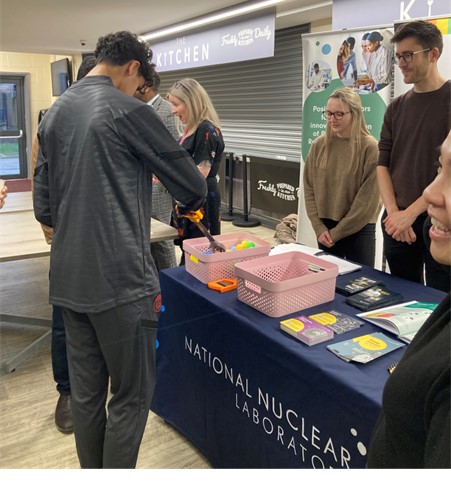Monday 15 April 2024
The vital role of parents in encouraging young people into STEM

NNL recently joined other Racial Equality in Nuclear (REiN) ambassadors at a high school in Bolton to speak with pupils and their carers about the different job opportunities in the nuclear industry. REiN is eliminating barriers that disallow ethnic communities from thriving in the nuclear sector.
Research shows that parents and carers are one of the biggest influences in the types of jobs that children consider for their future. The school has a diverse range of pupils, with a total of 37 languages spoken. We took the opportunity to share insights about the sector and see if a career in nuclear would be encouraged and supported.
The REiN Ambassadors set up a fun ‘nuclear waste’ sorting challenge and spoke with both carers and pupils about the different projects they were working on and the types of early careers available. They were asked to complete a short questionnaire to see whether they had considered a career in nuclear before the evening, and if they felt differently afterwards. Our results showed that 83% of parents / carers were more supportive of their child embarking on a career in nuclear.
On the other hand, some pupils were already considering a career in nuclear. After trying one of our ‘NNL lab’ games and talking to our ambassadors, around 60% moved at least one point more in favour of considering a career; with several moving from negative to positive.
Both groups were looking for information on qualifications. This pilot study supports research showing the importance of engaging at an early stage with pupils before they decide which GCSE options to take. This ensures they have kept all options open for a career in STEM.
Emin Veron, co-founder of REiN said:
“Too often aspirations for working in STEM or in a STEM adjacent profession are curtailed at the early stages in secondary school, where either a lack of knowledge about available opportunities, the risk of getting it wrong, or even stigma around choices can lead to people going down a different path. It was fantastic for REiN to join forces with organisations from across our sector, showing a united front, and amplifying the impact we have by working together. Through engagement with parents as a sector we can start to understand what students and the communities they are part of might think or experience – which might not be visible or obvious to us – and this is so important when we start to look at how to attract and retain skilled people who live at the many intersections of our society.”
